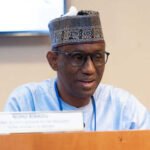Commercial drivers across many cities in Nigeria, including Abuja, have increased their fares following the petroleum subsidy removal as Nigerians experience another hardship.
Development Diaries reports that one litre of Premium Motor Spirit (PMS), popularly called petrol, is now N537 in Abuja and not less than N488 nationwide.
Transport fares have jumped by over 100 percent, depending on the routes, as Nigerians lament the high cost of the product.
In his inaugural speech, President Bola Tinubu affirmed that his administration would not continue to pay subsidy on PMS, adding that there was no provision for it in the 2023 Appropriation Act from June.
The 16th Nigerian leader and the country’s seventh president also said that given the high opportunity cost, the federal government was suffering to fund subsidies.
In some of the places visited in Abuja, our reporter observed that there were no queues in the station, but a few cars were driving in slowly to purchase PMS.
‘We are already used to all these kinds of hardships so we have to adjust. Everybody has to adjust their lives’, a resident, John Oko, told our reporter in Apo area of Abuja.
For a financial consultant, Thomos Ukoyo, he believes the policy is good. He however questioned the timing.
‘I just bought fuel for N10,000 which is more than what I buy before now. So it is not funny’, he said.
‘The people that subsidy is supposed to benefit don’t benefit from it. We have never bought fuel in my village for the official price. But when we talk about subsidy, we say it is meant to benefit the poor, but the poor don’t benefit [from it]’.
Another Abuja resident, who preferred anonymity, said it was unsustainable to buy PMS at N488 and above.
‘We are buying at N537. In the first place, that is not fair. Apart from fueling our cars, if we don’t have light we have to fuel our generators, and that is too expensive. We can’t sustain it’, he said.
As for Sadiq Musa, who looked despondent, he also questioned the timing of the removal of the petroleum subsidy.
‘I understand that the removal of the subsidy will go a long way to help the country, but at the same time, the economic situation that we find ourselves in has been difficult. Feeding and taking care of the family members at this time is killing. We are not finding it funny’, he lamented.
A construction worker, Sani Garba, believes the government should review the policy and come up with interventions that would cushion the harsh effect.
‘The subsidy removal is really biting; my pain is the fact that the common Nigerians are the ones suffering the effect. I think it’s rather too early to make us go through this suffering. it’s really telling on us’, he said.
‘I think the government has to review this policy and bring up measures that can cushion the effect of the subsidy removal. I think it will go a long way to help the majority of Nigerians.
Development Diaries finds it unacceptable that the masses have to, again, suffer over the removal of petrol subsidy when the cost of governance in the country remains high and the four state-owned refineries are not operational.
We call on President Tinubu to address Nigerians on how his administration plans to handle food inflation and provide alternative means of transportation.




